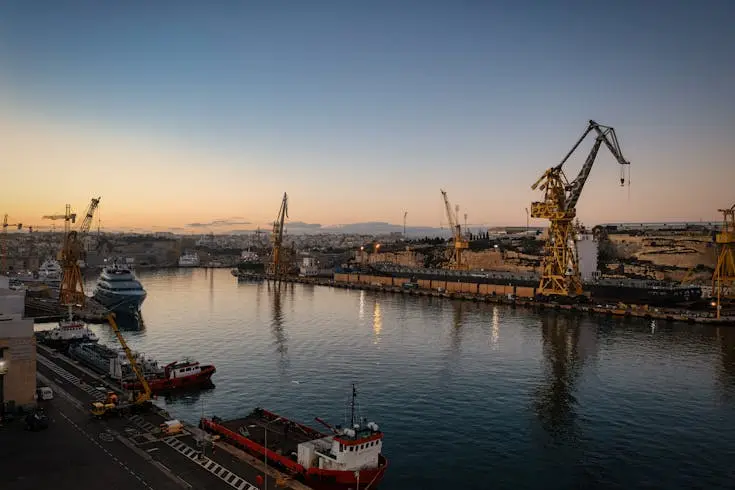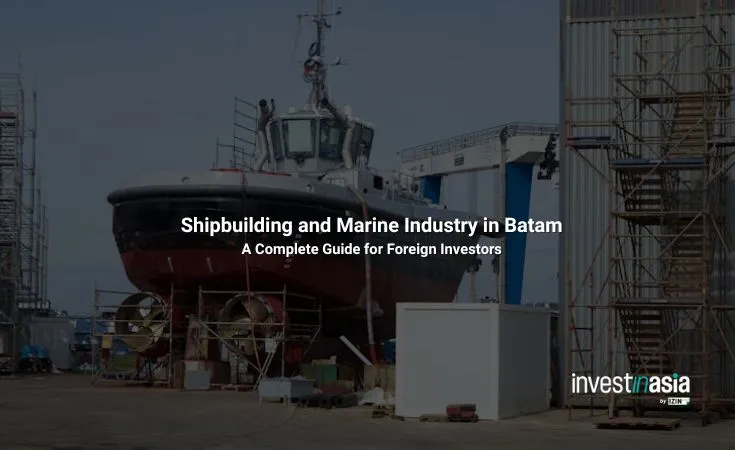Batam is fast becoming one of Asia’s most strategic hubs for the shipbuilding and marine industry. Just 30 km south of Singapore, this Indonesian island has evolved into a deep-water industrial cluster hosting over 130 shipyards. With tax incentives, a skilled workforce, and government-backed infrastructure, Batam offers unmatched potential for investors in marine construction, ship repair, and offshore engineering.
In this article, we explore Batam’s shipbuilding ecosystem—its evolution, advantages, challenges, and future—and guide you on how to start a marine company in Batam with the support of InvestinAsia’s Batam Business Registration Service.
Also read: Leading Industries in Batam: A Blueprint for Southeast Asia’s Industrial Future
Batam’s Rise as a Maritime Manufacturing Cluster


Batam transformed from a modest repair dock in the 1970s into Indonesia’s largest shipyard cluster. Key factors behind this growth include its Free Trade Zone (FTZ) status, deep-water coastlines, and proximity to the Malacca Strait, one of the world’s busiest maritime routes.
By 2024, Batam had recorded more than 130 active shipyards, including global players like ASL Marine, PaxOcean, and Batamec. These companies handle everything from Capesize dry-docking to new builds of naval, LNG, and offshore vessels.
Industrial Infrastructure: Built for Big Ships
Most shipyards are concentrated in Tanjung Uncang and Sekupang, which offer sheltered water, expansion-friendly land, and graving docks that support ships up to 300,000 DWT. PaxOcean’s new 300×59 m floating dock enables afloat repairs of Suezmax and VLCC vessels.
These shipyards operate within bonded zones, enabling duty-free import of machinery and steel and seamless re-export. Logistics is also simplified by Batam’s multipurpose port network and international ferry terminals.
Major Shipyards and Capabilities
| Yard (location) | Land / water frontage | Largest dock / lift | Core services | Notable projects / strengths |
|---|---|---|---|---|
| ASL Marine Batam (Tanjung Uncang) | 30 ha + 16 ha, sheltered waterfront | 300 000 DWT graving dock (340 × 60 m) + 2 graving docks 60 000 & 20 000 DWT | Newbuilds, repairs, conversions, offshore modules | Only yard in Indonesia able to dry-dock Capesize vessels; expanding dry-docks since 2006 |
| PaxOcean Pertama | 280 000 m² site; 2 400 m berth | Floating dock 300 × 59 m, 82 000 TLC (Suezmax) | Ship repair/conversion, offshore support-vessel newbuilds | Shares resources with Graha & Nanindah yards for flexible large-vessel work |
| PT Batamec | 64 ha; 555 m jetty | Graving dock 145 × 40 m, 160 000 T lifting (syncrolift) | Tanker, tug, barge and specialised vessel builds; repair | Established 1986; known for efficient production |
| Bandar Abadi | 2 dry-docks up to 202 m, 70 000 DWT | 202 × 32 m dry-dock | Naval & commercial shipbuilding (e.g., Teluk Bintuni LSTs) | Defence contracts; turnkey design capability |
| KTU Shipyard | 3 yards (Sagulung, Sekupang, Tanjung Riau) | Tug & barge series with Robert Allan Ltd. | Tugs, barges, tankers, general cargo | Pioneer in Indonesian-designed harbour tugs |
Workforce & Maritime Education
With over 60,000 skilled workers, Batam’s labor force is trained in ship welding, QC inspection, and offshore module design. Institutions like Politeknik Negeri Batam offer Applied Bachelor degrees tailored to shipbuilding careers. Many shipyards also run co-op programs and apprenticeships to meet international standards (IMO, class societies).
Also read: Batam Salary Guide: Regulations, Average Wages & High-Income Careers
Investor-Friendly Policies and Incentives


Batam operates under an FTZ/SEZ framework with powerful fiscal benefits:
- 0% import duties and VAT on raw materials, equipment, and components
- Tax holidays for strategic sectors like LNG vessels and offshore wind
- Accelerated permit processing is now possible via BP Batam’s integrated one-stop OSS platform.
Since 2021, BP Batam issues 67 categories of business permits, including reclamation and dredging—greatly simplifying expansion projects.
Also read: Incentives for Business and Investment in Batam
Opportunities and Challenges in Batam’s Marine Sector
Opportunities
- Surge in demand for green retrofits (LNG, scrubber systems)
- Cost-efficient relocation from Singapore
- Deep-water plots for mega-yards
- Growing demand for naval and offshore builds
Also read: Why Batam Is a Smart Choice for Doing Business
Challenges
- Environmental compliance (reclamation, dredging)
- Work safety risks
- Global overcapacity in shipyards
- Currency volatility and cost-plus contract pressures
Future Outlook: Doubling Down on Maritime GDP
Indonesia is targeting a twofold increase in maritime GDP, placing Batam as a key driver. Ongoing investments support this goal through advancements in digital licensing systems, shipyard infrastructure, and environmental and safety compliance. Recent moves include:
- New licensing rules allowing faster reclamation approvals
- Expanded docks by PaxOcean
- BP Batam’s commitment to solve on-ground investment bottlenecks
Also read: Batam’s Economic Growth: A Strategic Guide for Businesses and Investors
How Foreign Investors Can Start a Shipbuilding Business in Batam
Site Selection
Prioritize lots within Tanjung Uncang for cluster synergy, 7.5 m depth, and subcontractor access.
Business Licensing
Use BP Batam’s OSS portal to obtain permits for land, reclamation, dredging, and environmental approvals.
Legal Entity Formation
Set up a foreign-owned PT PMA and apply for relevant shipyard licenses. Combine FTZ and SEZ status for maximum tax relief.
Workforce Partnership
Collaborate with Polibatam and local training centers to ensure a skilled labor pipeline.
Compliance & Safety
Adopt international standards like ISO 45001 and follow BSOA safety protocols.
Also read: Complete Requirements for Company Registration in Batam
InvestinAsia: Your Trusted Partner in Batam Business Setup
Establishing a marine or shipyard company in Indonesia can be complex without the right support. InvestinAsia’s Batam Business Registration Service streamlines the process from end to end:
- Legal entity setup (PT PMA)
- OSS licensing
- FTZ/SEZ structuring
- Local partnerships & land acquisition
- Custom compliance & documentation
Whether you aim to build tankers, retrofit LNG systems, or offer offshore fabrication, InvestinAsia ensures your venture in Batam starts strong—with full legal and operational readiness.
Contact us now for FREE consultation!
Frequently Asked Questions (FAQs)
Why is Batam ideal for shipbuilding?
Batam offers deep-water access, FTZ tax benefits, skilled labor, and a location just 30 km from Singapore—ideal for large-scale marine operations.
Can foreigners own shipbuilding companies in Batam?
Yes. Foreign investors can fully own shipbuilding companies via PT PMA entities, with streamlined licensing through BP Batam.
What tax benefits are available in Batam?
0% VAT and import duties, income tax holidays, and waived customs duties for shipyard-related imports under FTZ/SEZ frameworks.
What types of vessels are built in Batam?
Everything from naval ships and tankers to tugs, barges, LNG vessels, and offshore support ships.




